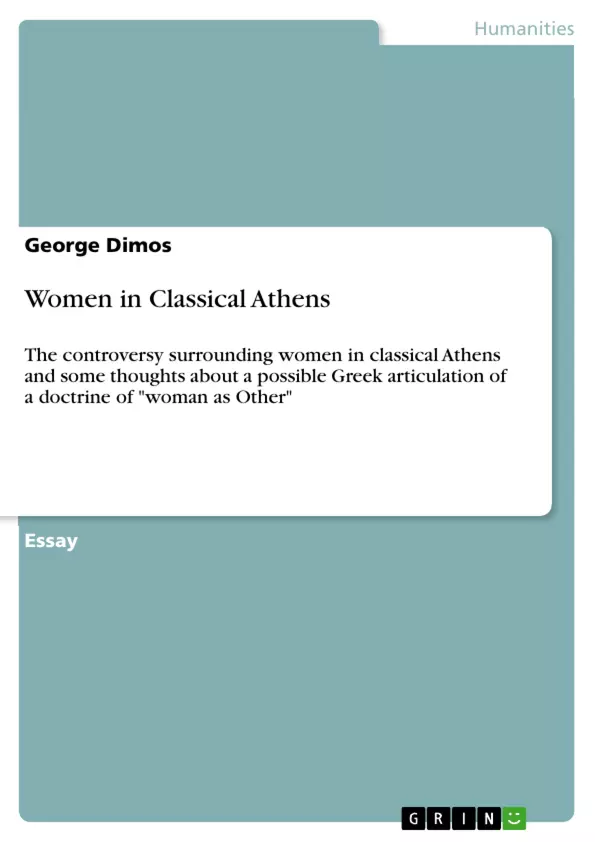The text summarizes and examines the five main categories of thought/ research that tried to interpret the man-woman relations in ancient Greece. That is authors that find a ‘patriarchal bias’, feminist and Marxist scholars; authors that used Freudian tools; feminist writers that analyzed some evidence (leaving aside the Marxist and Freudian stereotypes); and finally the thoughts of Foucault on the issue.
Then we discuss issues related to the interpretation or misinterpretations of Plato especially what some authors see as ‘contradictory sides of Plato’s views about women’ that are tied to the distinction he (supposedly) makes between soul and body. We touch the issue of misinterpretation of various Greek myths and also the missing references to the turbulence which characterizes the classical era.
Then we conclude that it is beyond doubt that there exists in Ancient Greece a male-female polarity but as most of the findings tend to show, this does not incite any hostility in the relations between the sexes. We then (and given the lack of serious research done on that issue) we proceed guided only by the Lacanian theory of ‘Other’ to propose a possible Greek articulation of the woman as ‘Other’.
Table of Contents
- INTRODUCTION
- THE CONTROVERSY
- THE WOMAN AS ‘OTHER’
- Man Woman
- A Possible Greek Articulation of Doctrine of Woman as ‘Other’
- CONCLUSION
Objectives and Key Themes
This work aims to analyze the controversial topic of women's status in classical Athens. By examining various perspectives, including feminist, Marxist, and Freudian interpretations, the author seeks to provide a comprehensive understanding of the historical and cultural context surrounding women's roles and limitations.
- The historical and cultural context of women's lives in classical Athens
- The controversy surrounding the interpretation of women's roles and status
- The concept of "woman as Other" and its potential Greek articulation
- Analysis of different perspectives on the subject, including feminist, Marxist, and Freudian views
- The limitations and restrictions faced by women in classical Athenian society
Chapter Summaries
- INTRODUCTION: This chapter introduces the five main categories of perspectives on women's status in classical Athens, highlighting the ongoing controversy surrounding the topic. The author emphasizes the need for a comprehensive and nuanced analysis.
- THE CONTROVERSY: This chapter presents the first category of views, characterized by an apologetic approach that often defends patriarchal biases and normalizes the status quo. The author examines the works of Gomme and Kitto, highlighting their arguments for the similarity between ancient Athenian and modern European practices.
Keywords
The primary keywords and focus topics of this text include women's status, classical Athens, patriarchal bias, feminist perspectives, Marxist interpretations, Freudian analysis, "woman as Other," and cultural context. The text explores these concepts through a critical examination of historical sources and scholarly debates, seeking to illuminate the complexities of women's lives in ancient Greek society.
Frequently Asked Questions
What was the status of women in classical Athens?
The status of women was characterized by significant limitations and restrictions, often described through a "patriarchal bias" where women were largely excluded from public and political life.
What does the concept "woman as Other" mean in ancient Greece?
Based on Lacanian theory, it suggests that women were defined and perceived as fundamentally different or secondary to the male norm, serving as a foil for male identity.
How did Plato view women?
Plato's views are often seen as contradictory. While he suggested some equality in certain contexts (like the soul), he also maintained traditional distinctions between the roles of the body and social status.
Did hostility exist between the sexes in ancient Greece?
While there was a clear male-female polarity and social inequality, research suggests this did not necessarily incite open hostility in daily personal relations between the sexes.
Which scholarly perspectives are used to analyze this topic?
The analysis includes feminist, Marxist, Freudian, and Foucault’s perspectives, each offering a different lens on power dynamics and social structures.
How do Greek myths reflect the role of women?
Myths often served to reinforce social norms and gender roles, though they are frequently misinterpreted by modern scholars who overlook the specific cultural context of the classical era.
- Citar trabajo
- George Dimos (Autor), 1987, Women in Classical Athens, Múnich, GRIN Verlag, https://www.grin.com/document/375514



